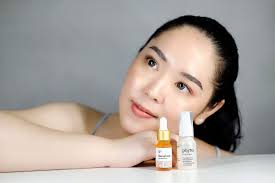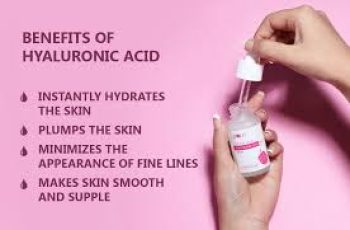
Can You Use Vitamin C and Peptides Together?
Peptides and vitamin C are two of the most celebrated ingredients in skincare. Both deliver impressive results on their own—but what happens when they’re used together?
Are they compatible, or do they cancel each other out?
If you’ve ever heard the myth that peptides and vitamin C can’t be used together, you’re not alone.
Today, we’ll explore the science behind this concern, clear up the confusion, and explain how you can safely pair these two powerful ingredients in your routine.
The Short Answer: Yes, You Can Use Peptides and Vitamin C Together
Let’s get this out of the way: peptides and vitamin C can be used together safely and effectively.
The idea that they can’t be combined comes from outdated research and misunderstandings about ingredient stability.
Today’s advanced formulations and better understanding of ingredient interactions mean these two can absolutely complement each other—when used correctly.
Why the Confusion?
Some early research suggested that combining acidic ingredients (like vitamin C) with peptides (especially copper peptides) could reduce their effectiveness.
The fear was that low pH environments might “break” the peptide bonds or cause them to degrade.
However, this has been largely debunked.
Modern studies and clinical practice show that well-formulated products containing both vitamin C and peptides can be beneficial—and many brands now successfully include both in a single product.
Vitamin C and Peptides: A Powerful Pair
Vitamin C and peptides serve different, but complementary roles in your skincare routine.
Benefits of Vitamin C:
Potent antioxidant that neutralizes free radical damage
Fades dark spots and evens skin tone
Boosts collagen production
Brightens dull complexions
Protects skin from UV and pollution damage
Benefits of Peptides:
Strengthens the skin barrier
Stimulates collagen and elastin production
Reduces fine lines and wrinkles
Calms inflammation and supports healing
Improves hydration and skin firmness
When combined, these two ingredients can provide a powerful anti-aging and skin-repairing boost.
When You Might Want to Avoid Using Them Together
While they’re compatible in theory, some people may still experience irritation when layering vitamin C and peptides—especially if they have sensitive or dry skin.
This isn’t because the ingredients clash chemically.
Instead, it’s usually due to the potency of vitamin C (especially in L-ascorbic acid form) irritating the skin, making it more reactive to anything applied after.
Signs of irritation may include:
Redness, Flushing, Tingling or stinging, Dry patches
If this sounds like your skin, don’t worry—you can still benefit from both ingredients. You just need to space them out.
How to Safely Use Vitamin C and Peptides in the Same Routine
If you want to avoid potential irritation but still get the benefits of both ingredients, here are a few dermatologist-approved strategies:
1. Use Vitamin C in the Morning, Peptides at Night
This is the most common and skin-friendly approach.
AM: Apply your vitamin C serum after cleansing. Follow with a moisturizer and sunscreen.
PM: Use your peptide serum or cream to help repair and hydrate the skin overnight.
This routine allows your skin to get the antioxidant protection of vitamin C during the day, and the skin-strengthening, collagen-boosting effects of peptides at night—without overloading your skin all at once.
2. Alternate Days
If you use a potent version of either ingredient (like a 20% vitamin C serum or a strong peptide complex), consider alternating the days you use each.
This gives your skin time to adapt while still gaining the benefits of both ingredients.
3. Layer by Texture, Not Ingredient
If you’re layering both products in the same routine, apply them in the right order.
Apply the product with the thinner consistency first.
For example, if you have a lightweight vitamin C serum and a thicker peptide moisturizer, apply the serum first.
Always finish with SPF in the morning.
What About Products That Combine Peptides and Vitamin C?
Yes, these exist—and when formulated well, they work beautifully.
Formulators can control pH, stabilize the ingredients, and ensure the final product delivers both actives without irritation.
Some serums are designed with gentle buffers or encapsulated delivery systems to minimize sensitivity.
If you’re unsure where to start, look for reputable brands with clinical testing and transparent ingredient lists.
Which Is Better: Peptides or Vitamin C?
That depends on your skin goals. Here’s a quick comparison:
Benefit Vitamin C Peptides
❌
❌
❌
If your main goals are brightening, antioxidant protection, and evening skin tone, vitamin C is ideal.
If you’re focused on repairing the barrier, calming inflammation, and improving hydration and firmness, peptides are the better fit.
That said, using both gives you a more complete approach to anti-aging and skin health.
Can You Use Peptides With Retinol?
Yes—but just like with vitamin C, it depends on your skin type and tolerance.
Peptides are gentler than retinol and can help reduce irritation caused by retinoids. If you’re new to retinol or have sensitive skin, applying peptides afterward can help restore and protect the skin barrier.
We go into more detail about this pairing in our [blog on peptides and retinol].
Recap: Peptides and Vitamin C—Together or Apart?
You can use vitamin C and peptides together, but the key is understanding your skin’s needs and sensitivity level.
Use them together if:
Your skin tolerates actives well
You’re using balanced formulations
You’re layering correctly (serum first, then moisturizer)
Use them separately if:
You have sensitive or dry skin
You experience redness or irritation
You’re using high concentrations of either ingredient
When used correctly, this duo can help you achieve smoother, firmer, brighter skin—without compromise.
Final Tips
Always patch test new products
Introduce new ingredients one at a time
Use sunscreen every morning, especially when using vitamin C
Store vitamin C in a dark, cool place to prevent oxidation
Ready to Personalize Your Skincare?
Not sure if your current products are working for your skin type? Take the Baumann Skin Type® quiz to find out exactly what your skin needs—and what to avoid.
That way, you’ll never waste money on ingredients or combinations that don’t serve your goals.
Follow us on Instagram @SkinTypeSolutions for more ingredient breakdowns, dermatologist-backed skincare tips, and product reviews.
DQH Knowledge drop: In your 20s, your skin cell turnover decreases. (Cell turnover is a key component in keeping your skin youthful.) You know what else slows down? Your collagen production. Starting in your 20s, collagen decreases by about 1 percent per year. Should you want to prevent fine lines and wrinkles, start by eliminating behaviors that contribute to premature aging. “If it’s bad for you, it’s bad for your skin,” says dermatologist Michel Somenek.
“Cigarette smoking reduces blood flow to the skin and causes premature wrinkling and a dull skin texture. Making the repeated pursed motion to inhale can also cause smoker’s lines. Alcohol and recreational drugs are toxins for the skin that damage its cellular structure and DNA,” Somenek tells us. “The faster you eliminate vices while you are young, the better chance your skin and body have to recuperate.” Also, adopting an anti-aging routine in your 20s is key. After all, the best offense is a good defense. We spoke to Somenek and experts Joshua Ross and Audrey Kunin to find out more.
Keep reading for the best anti-aging products for your 20s, according to skincare professionals.
Sunscreen
“We all know that the sun is the number one cause of skin aging and starting the prevention in your 20s is very important,” Ross says. “The majority of your sun damage won’t start to appear until you’re in your 30s, so don’t wait until you see it surface or you’ll be behind the curve. Stay ahead of it with a good-quality zinc-based sunscreen worn daily.”
Farmacy Green Defense Daily Mineral Sunscreen
An invisible sunscreen with SPF 30, plus botanical extracts meant to protect skin with tons of antioxidants. Bonus: It’s clean and fine to use under makeup.
Bareminerals Complexion Rescue™ Tinted Moisturizer Broad Spectrum SPF 30
Although we recommend you use your SPF and moisturizer separately, we also understand moments when you don’t have time or energy for that extra step. For those times, this bareMinerals moisturizer is a great thing to have on hand.
Vitamin C Serum
“A great introduction to anti-aging is to start with a vitamin C serum in your morning skincare routine,” Ross says. “It’s a powerful antioxidant that will neutralize free radicals and brighten the skin.” He adds that it’s a great way to counteract the effects of the sun’s harmful rays, which, as previously mentioned, are among the biggest causes of premature aging.
Drunk Elephant C-Firma™ Vitamin C Day Serum
The Drunk Elephant C-Firma is a lightweight serum that promises to give skin a glow by combining the brightening powers of vitamin C with ferulic acid, l-ascorbic acid, and vitamin E. The included sodium hyaluronate is meant to replace hydration loss, so you shouldn’t have to deal with any irritation.
Sunday Riley C.E.O. Rapid Flash Brightening Serum
This potent serum is jam-packed with vitamin C (15 percent, to be exact), which means it’s a potential superstar at both brightening skin and dousing it in antioxidants.
Peptides
Using peptides on your skin has many benefits, says Somenek. “The skin barrier is what defends the body against pollution, UV rays, bacteria, and toxins. It can be damaged by several everyday factors. Using topical peptides aids in building a stronger barrier,” he says. “Peptides comprise elastic fibers, which are a type of protein. These fibers help to make skin appear taut and firm. Peptides can also help repair damaged skin, relieve inflammation, and even out skin tone. Some peptides can kill acne-causing bacteria that is common in 20-somethings.”
Kunin agrees, saying, “Peptides are an excellent entry point for supporting collagen.” She recommends looking for face and eye treatments that contain these collagen-boosting powerhouses.
Charlotte Tilbury Magic Eye Rescue Cream
This Charlotte Tilbury super-emollient eye cream has a base of coconut oil and shea butter (read: it’s incredibly hydrating). Botanicals plus peptides are meant to help reduce dark circles and boost collagen, respectively.
This creamy moisturizer serves up potent collagen-boosting peptides and pycnogenol, and antioxidant-rich vitamin C. “Instead of sitting on top of the skin, peptides penetrate the outer layer so they go deep. The ‘signals’ they send tell the cells to produce elastin and collagen, which are needed for youthful-looking skin,” explains Somenek.
At-Home Peel Pads
Remember that skin cell turnover fiasco we talked about earlier? One way to help support it is by exfoliating. “Exfoliation is important to help keep skin fresh and luminous,” Kunin says. She recommends using at-home peel pads as an easy and effective way to exfoliate.
“The goal in your 20s is to fight the slowing pace of cell turnover. It is wise to use products that gently exfoliate, yet still remove oil and other impurities. Products that have Alpha Hydroxy Acids (AHA) or Beta Hydroxy Acids (BHA) are a good choice.”
According to Somenek, you should only exfoliate two to three times a week. “People of all ages are guilty of over-exfoliating and that can be too much of a good thing,” he says.
Dermadoctor Kakadu C Intensive Vitamin C Peel Pad
A few swipes of this Derma Doctor powerful peel pad promise to leave your skin glowing and smooth, thanks to the seven (yes, seven) types of chemical exfoliants, including AHA and BHA. It also contains vitamin C via Kakadu plum extract for added brightening and antioxidant protection.
KEY INGREDIENTS Kakadu plum extract is sourced from the Kakadu plum, a fruit grown in northern Australia. It contains vitamin C, which restores the skin’s natural barrier, increases collagen production, and soothes irritation.
Dr. Dennis Gross Skincare Alpha Beta® Universal Daily Peel Pads
These are the gold standard of peel pads, with a cult following and over 900 five-star reviews on Sephora. They’re easy to use and contain a blend of anti-aging exfoliating acids.
Emollient Night Cream
“In your 20s, you need to start upping the hydration in your skincare routine. You may have been cautious of over-moisturizing because of acne in your teens, but as you enter your 20s, your skin transitions and becomes drier,” Ross says. “I recommend an emollient night cream added into your evening skincare regimen.”
“Twenty-somethings need to make sure that they are not using creams that will clog their pores and cause excess oil production,” says Somenek. Opt for non-comedogenic products.
Cerave Skin Renewing Night Cream
One great choice is the CeraVe Skin Renewing Night Cream, which is a non-comedogenic night cream that leaves skin soft and glowy. It combines the moisturizing powers of ceramides and hyaluronic acid.
RoC Retinol Correxion Max Hydration Creme
“The best night cream ingredients contain retinol, benzoyl peroxide, and/or salicylic acid or hyaluronic acid. The goal is to moisturize, yet remove excess oil,” says Somenek. This Roc Retinol Correxion cream fits the bill as it contains both hyaluronic acid and retinol so it promises to moisturize while also being non-comedogenic.



